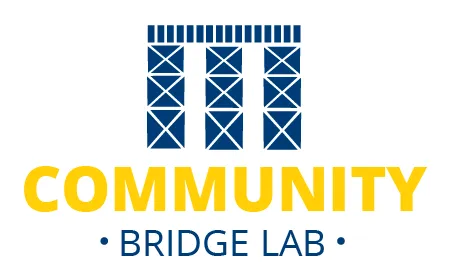The Community Bridge Lab at the University of Lethbridge
The University of Lethbridge Community Bridge Lab

Supporting Student Success in
QUALITATIVE AND COMMUNITY ENGAGED RESEARCH
Student-engaged and community-centric work is a strength of ULethbridge. The Community Bridge Lab connects academic and community organizations that have research and project needs with students with project ideas or skills to contribute. The lab provides infrastructure support in the form of space, computers, and other research equipment, as well as potential funding to support a variety of students and projects. A Steering Committee housed in the School of Liberal Education will coordinate opportunities, projects, and funding.
The Community Bridge Lab operates on the core values of real-world benefits of community-engaged, qualitative research conducted by undergraduate students working collaboratively with peers, graduate students, faculty, and community members.
We support student research in three main ways:
- We provide students who already have a relevant project underway with access to a space to work in, colleagues to work with, mentoring, and skills workshop activities.
- We are building an ongoing CBL project, which will engage students to work on pieces of a long-term community project.
- We connect community organizations looking for student research expertise with suitable students
SPECIFIC OUTCOMES:
- We provide lab space for cooperative work that facilitates face-to-face collaboration on projects, amplifies connections, and builds skills while supported through supervision and informal mentoring.
- We support community-engaged student projects that speak to local issues and demonstrate the role of undergraduate and graduate research in identifying and addressing social problems.
- We provide extensive student training in areas such as data management, outreach, networking, software packages, public speaking, presentation experience, and teaching experience.
- Students with projects can apply for funding for part-time or full-time funding.
- We will host presentations and a multi-media archive of projects and their outcomes, to offer a community-friendly understanding of what social science and humanities research can provide.
- We offer promotion on campus and in the community, with regular events, talks, posters, school visits, city visits, and an annual Community Bridge Day to showcase work, results, and to build relationships, connections, and future collaborative research projects.
Community Bridge Lab (CBL) Manager
Steering Committee:
Current
Dr. Jodie Asselin, Dept. of Anthropology
Dr. Julie Young, Dept. of Geography
Dr. Kaylan Schwarz, School of Liberal Education
Dr. Bronwyn Bragg, Dept. of Geography
Emeritus
Dr. Jan Newberry, Dept. of Anthropology
Dr. Shelly Wismath, School of Liberal Education.
Testimonial: Being part of the Community Bridge Lab for multiple years, I’ve seen growth in myself, my peers, and the lab itself. This Lab has provided training opportunities such as how to conduct qualitative coding, how to transcribe, and professional development. Most importantly, it has allowed me to develop relationships with other Social Science students that I might not have met otherwise in my education. These relationships have persisted outside of project completion, graduations and I find that we still lean on each other for academic and non-academic support. These relationships are meaningful, supportive and have taught me about what sort of academic career I might want outside of my degree. The Community Bridge Lab offers the support that its fellows need from term to term, but ultimately it is a supportive lab, guided by an extremely supportive steering committee.
Rebeca Spencer
